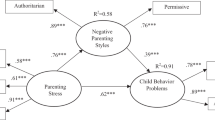Abstract
After Diane Baumrind described the parental styles, many authors have studied their impact on different dimensions of children's development and mental health at the age of adolescence. However, few studies have aimed to explore the impact of parental style on mental health in adulthood and the recovery process. The present study aims to fill this gap. The case presented in this paper is part of a body of forty life story interviews with Romanian immigrants. The choice of this case is justified by the complexity of the narrative and the fact that it best reflects the researched issues. This study presents how the authoritarian style manifested by the interviewee's parents, in an interdependence culture, influenced how she felt, thought and acted at different stages of her life course, until falling into depression. Also, the study presents the winding road of recovery from depression. An authoritarian parenting style, manifested in a family environment in which the interdependence of members is strongly promoted, can affect mental health, creating vulnerability to depression. Understanding the past seems to be the foundation for the beginning of a journey for the personal reconstruction of a new and dynamic sense of self, in the winding road of recovery.
Similar content being viewed by others
References
Azungah T. Qualitative research: deductive and inductive approaches to data analysis. Qual Res J. 2018;18(4):383–400. https://doi.org/10.1108/QRJ-D-18-00035.
Amato PR, Kane JB. Life-course pathways and the psychosocial adjustment of young adult women. J Marriage Fam. 2011;73(1):279–95. https://doi.org/10.1111/j.1741-3737.2010.00804.x.
Amering M, Schmolke M. Recovery in mental health reshaping scientific and clinical responsibilities. Oxford: Wiley; 2009.
Anhalt K, Morris TL. Parenting characteristics associated with anxiety and depression: a multivariate approach. J Early Intensive Behavior Interv. 2008;5(3):122–37. https://doi.org/10.1037/h0100427.
Anthony WA. Recovery from mental illness: the guiding vision of the mental health service system in the 1990s. Psychosoc Rehabil J. 1990s;16(4):11–23. https://doi.org/10.1037/h0095655.
Baumrind D. The influence of parenting style on adolescent competence and substance use. J Early Adolesc. 1991;11(1):56–955. https://doi.org/10.1177/0272431691111004.
Baumrind D. Effects of authoritative parental control on child behavior. Child Dev. 1966;37(4):887. https://doi.org/10.2307/1126611.
Baumrind D. The discipline controversy revisited. Fam Relat. 1996;45(4):405. https://doi.org/10.2307/585170.
Baumrind D. Patterns of parental authority and adolescent autonomy. New Direct Child Adolesc Dev. 2005;2005(108):61–9. https://doi.org/10.1002/cd.128.
Chen Y, Kubzansky LD, Van der Weele TJ. Parental warmth and flourishing in mid-life. Soc Sci Medi. 2019;220:65–72. https://doi.org/10.1016/j.socscimed.2018.10.026.
Davidson L, Strauss JS. Sense of self in recovery from severe mental illness. Br J Med Psychol. 1992;65(2):131–45. https://doi.org/10.1111/j.2044-8341.1992.tb01693.x.
Deegan P. Recovery as a journey of the heart. Psychiatr Rehabil J. 1996;19(3):91–7. https://doi.org/10.1037/h0101301.
Jack DC, Ali A. Introduction: culture, self-silencing, and depression: a contextual-relational perspective. In: Jack DC, Ali A, editors. Silencing the self across cultures: Depression and gender in the social world. New York: Oxford University Press; 2010. p. 3–17.
Jeynes WH. A meta-analysis: the effects of parental involvement on minority children’s academic achievement. Educ Urban Soc. 2003;35(2):202–18. https://doi.org/10.1177/0013124502239392.
Kâğıtçıbaşı Ç. Family and human development across cultures: a view from the other side. New York: Psychology Press; 2014.
Kâğıtçıbaşı Ç. Family, self, and human development across cultures: Theory and applications. Classic ed. New York: Routledge, Taylor & Francis Group; 2017.
Kogstad RE, Ekeland T-J, Hummelvoll JK. In defence of a humanistic approach to mental health care: recovery processes investigated with the help of clients’ narratives on turning points and processes of gradual change: clients’ narratives about recovery processes. J Psychiatr Ment Health Nurs. 2011;18(6):479–86. https://doi.org/10.1111/j.1365-2850.2011.01695.x.
Paterniti S, Sterner I, Caldwell C, Bisserbe J-C. Childhood neglect predicts the course of major depression in a tertiary care sample: a follow-up study. BMC Psychiat. 2017;17(1):113. https://doi.org/10.1186/s12888-017-1270-x.
Pinquart M. Associations of parenting dimensions and styles with externalizing problems of children and adolescents: an updated meta-analysis. Dev Psychol. 2017;53(5):873–932. https://doi.org/10.1037/dev0000295.
Schön U-K, Denhov A, Topor A. Social relationships as a decisive factor in recovering from severe mental illness. Int J Soc Psychiat. 2009;55(4):336–47. https://doi.org/10.1177/0020764008093686.
Schrank B, Bird V, Rudnick A, Slade M. Determinants, self-management strategies and interventions for hope in people with mental disorders: systematic search and narrative review. Soc Sci Med. 2012;74(4):554–64. https://doi.org/10.1016/j.socscimed.2011.11.008.
Shah R, Waller G. Parental style and vulnerability to depression: the role of core beliefs. J Nerv Men Disease. 2000;188(1):19–25. https://doi.org/10.1097/00005053-200001000-00004.
Slade M. Personal recovery and mental illness: a guide for mental health professionals. Cambridge: Cambridge University Press; 2009.
Smith JA, Osborn M. Interpretative phenomenological analysis. In: Smith JA, editor. Qualitative psychology: a practical guide to research methods. London: SAGE Publications Ltd; 2008. p. 53–80.
Smith JA, Flowers P, Larkin M. Interpretative phenomenological analysis: theory, method and research. London: SAGE Publications Ltd; 2009.
Stafford M, Kuh DL, Gale CR, Mishra G, Richards M. Parent–child relationships and offspring’s positive mental wellbeing from adolescence to early older age. J Posit Psychol. 2016;11(3):326–37. https://doi.org/10.1080/17439760.2015.1081971.
Vogel PA, Stiles TC, Nordahl HM. Recollections of parent-child relationships in OCD out-patients compared to depressed out-patients and healthy controls. Acta Psychiatr Scand. 1997;96(6):469–74. https://doi.org/10.1111/j.1600-0447.1997.tb09949.x.
Wisdom JP, Bruce K, Auzeen Saedi G, Weis T, Green CA. Stealing me from myself: identity and recovery in personal accounts of mental illness. Aust N Z J Psychiat. 2008;42(6):489–95. https://doi.org/10.1080/00048670802050579.
Funding
This work was supported by a grant of the Romanian National Authority for Scientific Research and Innovation, CNCS/CCCDI – UEFISCDI, project number PN-III-P4-ID-ERC- 2016-0005 within PNCDI III.
Author information
Authors and Affiliations
Corresponding author
Ethics declarations
Conflict of interest
The author declare that she has no conflict of interest.
Ethical approval
The whole research was conducted with the approval of the Ethics Commission for Research in Social Sciences of the Lucian Blaga University of Sibiu and respects national and international ethical standards in the field.
Informed consent
The interviewee gave informed consent to participate in the research.
Additional information
Publisher's Note
Springer Nature remains neutral with regard to jurisdictional claims in published maps and institutional affiliations.
Rights and permissions
About this article
Cite this article
Bejenaru, A. Depression As a Path to Change: An Adult Woman's Voice About Parenting Practices, Mental Health and Recovery. J. Psychosoc. Rehabil. Ment. Health 8, 11–18 (2021). https://doi.org/10.1007/s40737-020-00194-5
Received:
Accepted:
Published:
Issue Date:
DOI: https://doi.org/10.1007/s40737-020-00194-5




